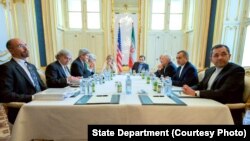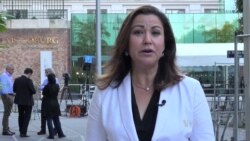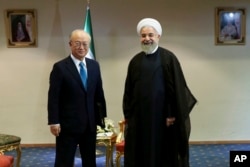U.S. officials in Vienna say international nuclear and sanctions experts are grinding through details of various issues in an effort to negotiate a final agreement on Iran's controversial nuclear program.
A senior U.S. State Department official said "expert groups" are taking advantage of time most of the top ministers involved in talks are out of town to do the detailed hard work involved in the process, noting that it is "clear that there are still big issues that are not resolved."
The official said the key ministers are expected back in Vienna Sunday, and that "eventually, this is going to have to come down to some significant political decisions that can only be made at the level of ministers," followed by agreement from the leaders of Iran and the P5+1 countries involved in negotiations.
U.S. Secretary of State John Kerry met twice Friday with Iranian Foreign Minister Mohammad Javad Zarif in Vienna to discuss key disputes that prevented nuclear negotiators from meeting a June 30 deadline for an agreement.
Kerry said negotiators have a lot of work to do and there are some tough issues.
Zarif echoed his statements, saying "we are all trying very hard in order to be able to move forward and we have made some progress."
A senior U.S. official said the White House remains convinced that "if the right choices don't get made and a good deal is not available" then the United States will be "more than comfortable stepping away." He added that if talks get "exceedingly close" to a comprehensive deal it is "conceivable" negotiations could go beyond the self-imposed July 7 deadline.
Separately, in a statement on YouTube, Zarif said Iran and world powers have never been closer to reaching a deal, adding that he sees the "emergence of reason over illusion."
IAEA involvement
Earlier, IAEA Director General Yukiya Amano visited Tehran, where he met with President Hassan Rouhani and Secretary of the Supreme National Security Council Ali Shamkhani.
But, speaking in English from a balcony of the hotel hosting the talks in Vienna, he also warned there is “no guarantee" of success.
When asked about the video, the senior U.S. administration official declined to specifically comment Iran's objective in releasing it.
"What the negotiations are trying to do is to come up with an agreement that demonstrates conclusively that Iran's nuclear program is peaceful and that is the primary objective from our perspective," the official said.
The talks were aimed at moving forward on sticking points regarding IAEA monitoring and verification of Iran's nuclear sites under an agreement.
"I believe that both sides have a better understanding on some ways forward, though more work will be needed," Amano told reporters.
Iranian state TV put a positive face on the Amano visit to Tehran, saying his presence in the Iranian capital showed the will to overcome key sticking points to a nuclear deal.
WATCH: VOA's Mary Alice Salinas reports from Vienna
Upcoming deadline
Negotiators from Iran and six world powers have given themselves a Tuesday deadline (July 7) to come up with a comprehensive deal to lift international sanctions in exchange for Tehran scaling back its nuclear program.
The discussions in Vienna have been described by officials as slow-moving but headed in the right direction.
"I don't think we're at any kind of a breakthrough moment yet," said British Foreign Secretary Philip Hammond on Thursday. "We will continue to do whatever we need to do to keep the momentum."
Senior diplomats from the United States, Britain, China, France, Russia and Germany have joined their Iranian counterparts for the talks, which were extended for a week after negotiators missed a June 30 deadline.
"Things have advanced, but we have not yet reached the end," said French Foreign Minister Laurent Fabius late Thursday.
Russian Deputy Foreign Minister Sergei Ryabkov said over 90 percent of the deal has been agreed to and that the remaining problems could be worked out within days.
Iranian negotiators have taken a hard stance, at least publicly, on several key unresolved issues.
For instance, Iran says it wants the sanctions to be lifted immediately and permanently, with no ability to automatically "snap back" into effect if the terms of the deal are violated.
There is also a disagreement over what access international inspectors would have to Iran's nuclear and military facilities, as well as sensitive documents related to the atomic program.
IAEA protocols
A senior Iranian official told reporters the issue could be resolved by Tehran agreeing to the International Atomic Energy Agency's rules known as the "Additional Protocol."
But U.S. officials view the IAEA protocols as insufficient because they would allow Iran to deny access to certain sites.
The U.S. and its allies for years have suspected Iran's nuclear program is aimed at building a nuclear weapon. Iran denies this, saying the program only has peaceful, civilian purposes.
Edward Yeranian contributed to this report from Cairo.







